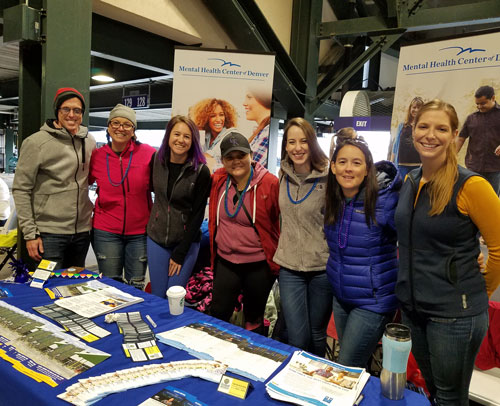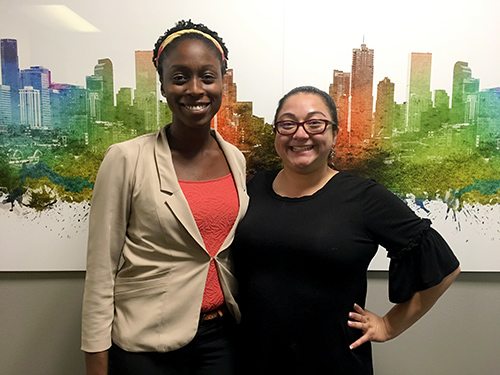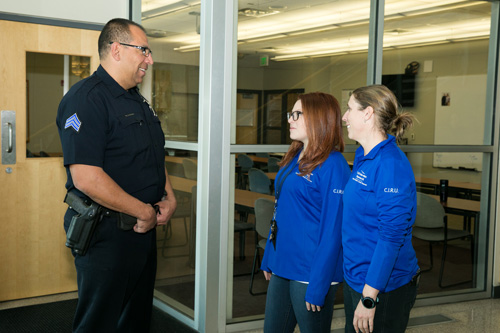2018 Report to the Community
Our 2018 Report to the Community is an opportunity to share our accomplishments and celebrate the support of our donors, employees, partners, community and those we serve.
Sanderson Apartments
Paul Brokering Photography

2018 Report to the Community
Our 2018 Report to the Community is an opportunity to share our accomplishments and celebrate the support of our donors, employees, partners, community and those we serve.
Suicide Prevention Efforts
Suicide rates continue to rise in Denver. Suicide does not discriminate and impacts us all. As part of the WellPower’s commitment to enrich the well-being of the people and communities we serve, we take a proactive approach to suicide prevention.
We adopted the Zero Suicide protocol, a national model and statewide initiative aimed at reducing deaths by suicide, increasing support and collaborating care across behavioral health, physical care, spiritual and criminal justice systems.
“This aspirational challenge provides a framework to transform the entire healthcare system, so we can intervene with people before it is too late,” said Steve Fisher, LPC, co-leader of our Zero Suicide implementation team.
Through the seven quality improvement elements of Zero Suicide, we’ve implemented a comprehensive training plan for all staff to understand the risks and warning signs; developed standardized risk assessments and interventions; integrated a suicide prevention pathway to better identify those at risk and keep them safe; and utilized evidence-based therapy models that reinforce caring connections.
“Zero Suicide is a best practice suicide prevention model that supports training for clinical and non-clinical staff, standardized assessments and interventions, the use of evidence-based practices for treatment, and the use of data to improve suicide prevention efforts within our organization and within the larger community,” said Kim Pfaff, PsyD, co-leader of our Zero Suicide implementation team.
Suicide prevention takes a collaborative approach and we have increased access to care through our community partners. By integrating services across the lifespan, we meet people where they are and provide support when someone needs it most. WellPower staff are embedded in community settings, such as schools, faith communities, doctor’s offices, youth centers and courts, to name a few.
Protective factors, such as connectedness, life skills and self-esteem, help safeguard people from suicide. Emerson St. for Teens & Young Adults, NextChapter in Education & Employment, Dahlia Campus for Health & Well-Being and Voz y Corazón are some programs we offer that help to reduce isolation, increase supports, strengthen coping skills and develop a sense of purpose and connection.
Our suicide prevention efforts are directed to help the people we serve and the larger community by cultivating a caring, hopeful and supportive environment. By reducing risks and connecting people with resources and supports, we can make an impact on someone’s well-being.
Finding Employment Through NextChapter
161
Individuals Found Employment
Through NextChapter
When Jonathan started using services with the WellPower, he felt like he was barely scraping by. He felt limited in what he could do with the resources he had access to and was living in a hand-to-mouth cycle that seemed without end. And then Jonathan went to NextChapter in Education & Employment.
From the moment he walked through the doors, everyone was wonderful to him. They were patient, kind, and understanding about his history with mental illness. They asked him what his goals were, and where he wanted to find success.
The first vocational counselor Jonathan spoke to, encouraged him to go back to school. He began working with the Education team at NextChapter and with their mentorship, enrolled in Emily Griffith Technical College.
Over the course of his studies, the staff at NextChapter were unfailing in their encouragement of Jonathan. “They gave me the little kick in the pants I needed,” he said. “They helped ignite my inner fire.”
With their support, Jonathan completed a program in Water Quality Management, graduating first in his class and earning four state certifications in water treatment, waste water treatment, waste water collection and water distribution.
NextChapter’s support didn’t end with Jonathan’s graduation. He began working with the Employment team soon after finishing his education and within a month, found a career with an environmental compliance agency as a Wastewater Collection Operator. He is proud to say he stuck with the job and was promoted to his current position as Wastewater Treatment Operator.
Jonathan is so grateful to the WellPower and NextChapter. With the organization’s help and support, he lives a more secure, stable and safe life. He says his life isn’t so much of a struggle anymore, and that he can focus on his goals for the future, like buying a house. Of all the things Jonathan values from his experience with NextChapter, he says he cherishes his true independence most.
As he looks to the future, Jonathan hopes to become a AAA Operator, the top certification in all areas for the state of Colorado.
School-Based Services Expand & Serve the Lifespan
27
Schools in the Denver Public School District have Our Therapists Located Directly in Their Building
The need for mental health services within schools is increasing in the Denver community. The WellPower’s school-based team of therapists receives calls from schools on a regular basis asking how they can get therapy services in their building. And last year, the organization’s team received more than 2,000 referrals from schools, parents and kids themselves.
“Schools can offer information about resources in the community, but often times families can’t get to those resources because of lack of a transportation, or they don’t feel comfortable going into a mental health setting,” said Emily Garcia, program manager of the WellPower’s school-based team.
The school’s staff can provide short-term, solution-focused work for the kids, such as helping them develop social skills and providing them with tools on how to deal with bullying. The WellPower’s therapists step in when they get referrals for kids who need more intensive services. The team provides in-depth individual, family and group therapy services.
“The most important thing is we’re making sure the children and families we serve are comfortable and understand that mental health is not a problem,” Emily said. “Anyone can experience a need in their life that they need to access therapy for.”
And although funding can be limited, the WellPower was able to add five new clinicians to the team and expand its services to six additional elementary schools this past year. The new positions were funded by two grants obtained by Denver Public Schools. In total, the team has 16 clinicians and is present in 27 elementary, middle and high schools. As of February 1, 2019, the school-based team has provided services to 538 children and families during the 2018-2019 school year.
“We are the first contact they have with mental health,” Emily said. “And we have the full package. Anyone can get connected to a whole array of services, like psychiatric services, case management and psychiatric testing, just by being connected with one of our school-based therapists.”
The new positions also focus on serving individuals across the entire lifespan. So, they provide services for caregivers and family members, ranging from preschoolers to elderly adults – not just school-age children. One therapist even has plans to start a grandparent caregivers support group. For two of the new positions, anyone of any age living in the surrounding area can access services located at the schools, even if they don’t attend that school or have children attending the school.
“The ability to meet people where they are, reduce barriers to get them into treatment, and make mental health more accessible and relatable is huge,” Emily said. “It feels safe, and it’s comfortable for them because it’s something that’s just happening in the school.”
Rose Grant Supports
Immigrants & Refugees
$30,000
Grant to Increase Access to Services for Immigrant & Refugee Communities
In 2018, WellPower was awarded a $30,000 grant from the Rose Community Foundation to help immigrant and refugee communities access services at our sites by reaching out through several faith communities. Jamie Adasi, Faith and Spiritual Inclusiveness Director, was soon joined by Michelle Pacheco, Immigrant and Refugee Health Navigator / Community Liaison, to begin outreach work with organizations throughout Denver.
Within two months of hiring Michelle, Jamie and Michelle quickly realized that WellPower staff needed additional training to ensure the organization could provide fully inclusive services to immigrant and refugee communities.
Before reaching out to faith communities, Jamie and Michelle created new goals to train at least 15% of WellPower employees within the planning grant period. Since training staff, Michelle has worked on hundreds of collaborative consultations with organizations such as Latina Safehouse, Jewish Family Service, Colorado Latino Leadership Advocacy Research Organization and many others. This work has helped create critical bridges in understanding the unique challenges faced by immigrant and refugee communities, as well as fostering opportunities for people to receive services that meet them where they are.
To understand why this work is important, Jamie says, “This is a community where there are already so many barriers around mental health and asking for help, and where people may feel scared to come forward. It’s important that we reach out to say we hear you, we value your experiences and how can we be of service to you?”
In addition to creating the Understanding Trauma & Resiliency for Immigrants & Refugees training, Michelle established an internal database of resources for immigrants and refugees. These resources provide valuable information for vulnerable communities trying to find safety, health and well-being in the United States. Staff members who were immigrants, refugees and former asylees themselves have expressed gratitude for having this information shared with the masses, and for not having to be the only one educating others on these issues.
Through the training and outreach efforts, the project has shown positive effects, resulting in additional funding. As the project moves forward, Jamie and Michelle hope to hire additional community liaisons and expand the services and resources offered to immigrant and refugee communities in Denver.
Co-Responder Program Expands
99%
of Contacts Diverted from Arrests
Denver Police officers working with our co-responders have gained options beyond bringing a person experiencing a mental health crisis to jail or to the hospital. With the co-responder program in place, all Denver Police districts have access to a licensed social worker to respond to crisis calls along with officers. During an encounter, the clinician will assess the individual’s condition to determine the best course of action that will meet the individual’s needs. Co-responders can link individuals to community resources, alternative crisis options and long-term community support. In many cases, individuals are also enrolled in services at the WellPower.
Since its inception in April 2016, the co-responder program has steadily grown from its original three staff members, ending Fiscal Year 2018 with 14 clinicians and interns. The increase in staff has allowed for more community members to be served appropriately. In FY18, the team had contact with 989 individuals. The program has proven so effective that it was a finalist for Harvard’s 2018 Innovations in American Government Awards, which recognizes the nation’s most creative and effective government initiatives.
The co-responder program has connected people to services when they need them. “Our co-responders seek to provide access to services that are welcoming and create and environment of healing during a vulnerable time in someone’s lives,” said Chris Richardson, Co-responder Program Manager at the WellPower. The results of their encounters with co-responders have a positive impact on the individual and on the community’s well-being.






